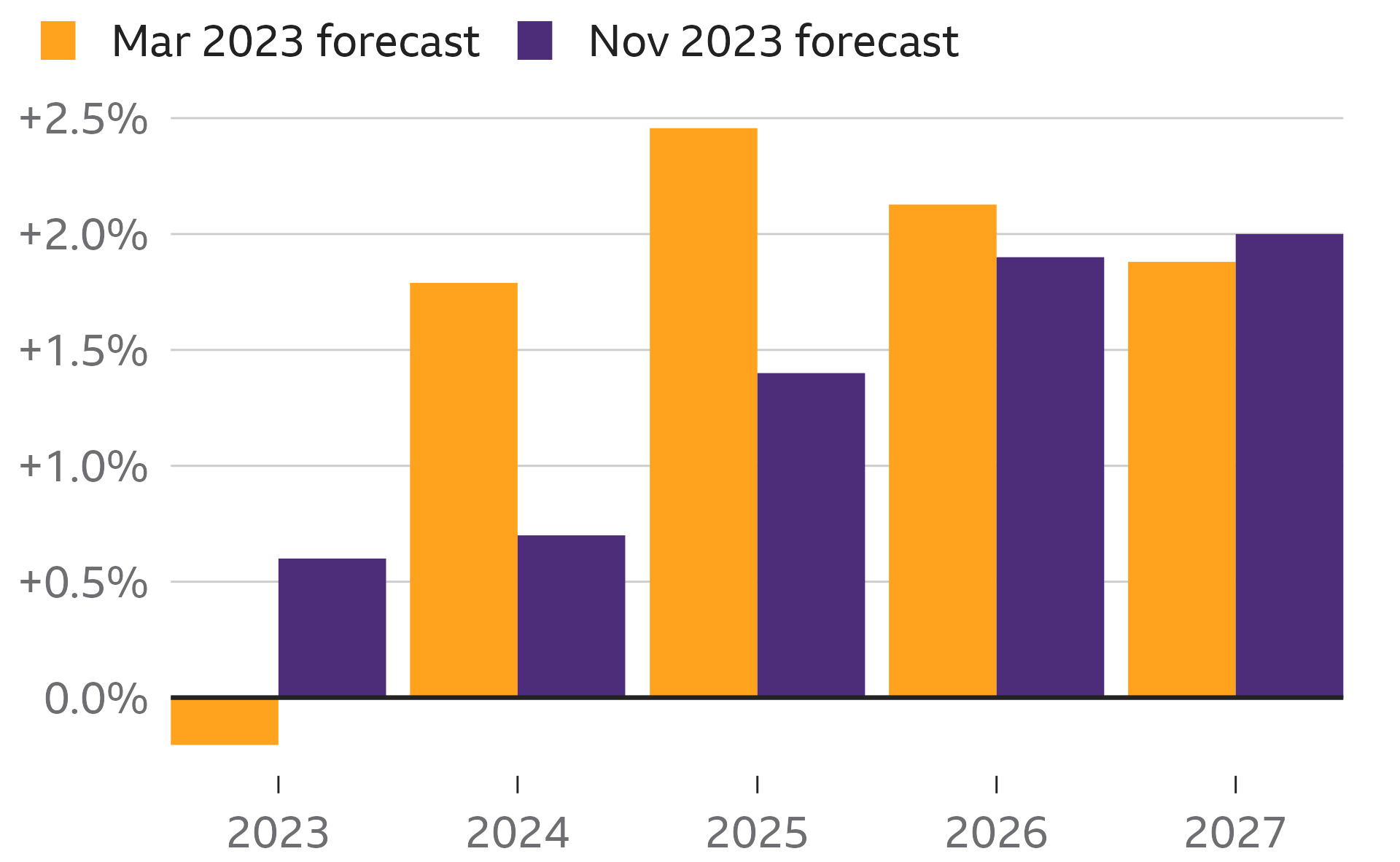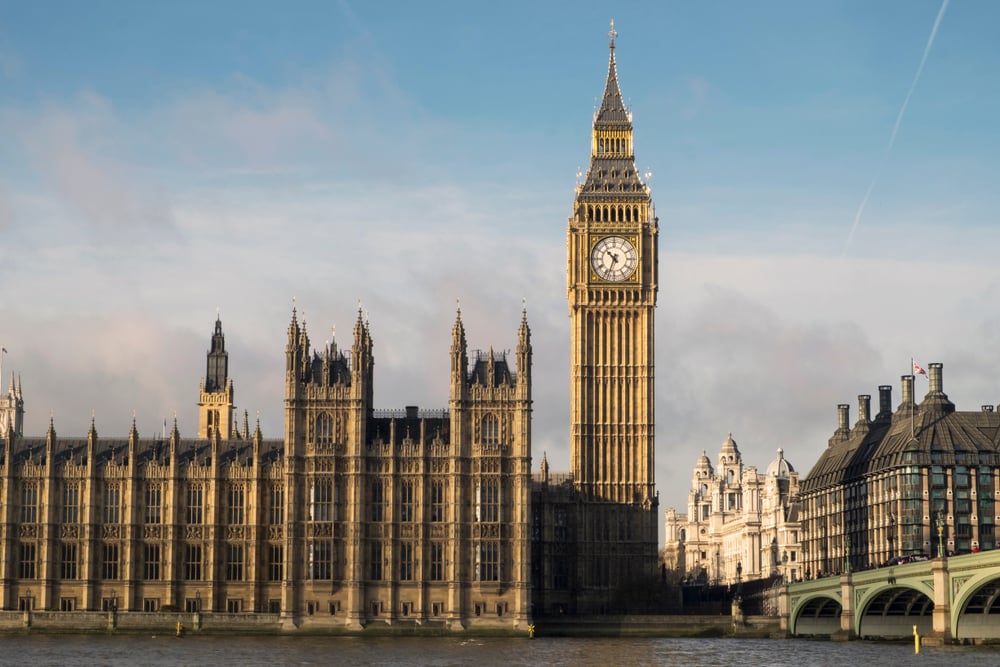Weekly Briefing: Key announcements from the Autumn Statement
In the opening to his Autumn Statement, Chancellor Jeremy Hunt said he would deliver 110 growth measures; measures which the Office for Budget Responsibility (OBR) stated would raise investment, increase employment and raise GDP.
In this week’s briefing, we’ll cover some of the key measures surrounding taxation and investment announced by the Chancellor, as well as the latest OBR forecasts on the UK economy.
Taxes
‘Emergency’ 2% Cut to National Insurance
- The Chancellor announced a 2% cut to the main national insurance (NI) rate for employees, falling from 12% to 10%.
- This will benefit 27 million people and save those on an average salary (£35,400) over £450 per year.
- Whilst tax changes usually don’t come into effect until the new tax year begins on 6th April, Hunt revealed he would introduce emergency legislation to make this NI cut applicable from 6th January 2024.
- According to the Chancellor, the OBR expects this measure to lead to the workforce increasing by 94,000.
- The main rate of NI for the self-employed (Class 4 NICs) was also cut in the Autumn Statement, down 1% from 9% to 8%.
- This change is worth £350 for the average self-employed person earning £28,200.
Full Expensing Made Permanent
- Full Expensing – whereby UK businesses are able to deduct the full cost of investing in machinery and equipment from their tax bill – has been made permanent.
- The tax break was originally announced in the March 2023 Budget and was intended to run from 6th April 2023 to 31st March 2026.
- Chancellor Jeremy Hunt called it “the largest business tax cut in modern British history” and stated the measure will increase business investment by £20 billion per year, almost 1% of GDP.
- The Treasury said: “Due to the success of Full Expensing, we are making it permanent. This means that companies that invest in the UK will reduce their tax by up to 25p for every £1 they spend on plant and machinery.”
Investment
EIS and VCT Sunset Clauses Extended by a Decade
- The Government has shown support for the Enterprise Investment Scheme (EIS) and Venture Capital Trusts (VCTs) by extending their sunset clauses – which were required under EU state-aid directives – from April 2025 to 2035.
- Plans to extend the sunset clause past 2025 were initially announced by the Treasury in October, and the decade-long extension has now been officially set forth in documents accompanying the Chancellor’s Autumn Statement speech.
- The original 2025 date meant that investors would no longer benefit from the 30% income tax relief (along with other tax benefits) offered by these popular products in just over a year.
- In the documents announcing the measure, the Government state: “The measure ensures that the UK will continue to provide generous tax incentives to encourage private investment into those smaller, younger companies.”
- The latest data provided by HMRC found that in 2021/22, 4,480 companies raised a total of £2,305 million of funds under the EIS scheme, the highest number of companies and total amount raised since the scheme was introduced.
- In the same period, VCTs issued shares to the value of £1,122 million, 68% higher than the 2020/21 figure.
ISA Changes
- After much speculation in recent weeks regarding potential upcoming changes to the Individual Savings Account (ISA) market, a number of reforms were set out in the Autumn Statement’s accompanying documents.
- From 6th April 2024, ISA savers and investors will be able to open more than one of the same type of ISA product per tax year. It’s thought this will help to keep rates competitive, as it’s possible to move funds to the same type of ISA with a different provider in order to target more attractive returns.
- Under current rules, when transferring funds from an ISA that was opened in the current tax year to another ISA, funds must be transferred in full. However it was announced in the Autumn Statement that as of 6th April 2024, partial transfers will be allowed regardless of when the account was opened.
- A boost for the Innovative Finance ISA (IFISA) was also delivered, as the range of eligible investments for this product is to be expanded to include long-term asset funds and open-ended property funds with extended notice periods.
A Boost For Existing Investment Zones and Five New Additions
- The Chancellor revealed that financial incentives for investment zones and tax reliefs for freeports would be extended from five to 10 years, and a £150 million ‘Investment Opportunity Fund’ would be set-up in order to catalyse investment into the programme.
- In addition, five new investment zones were announced across England and Wales. These will be located in West Yorkshire, the West Midlands, the East Midlands, Greater Manchester and Wrexham and Flintshire.
- It’s expected these measures will help to create £3.4 billion of private investment and 65,000 new jobs, Hunt stated.
UK Economy
2023 Growth Stronger Than Expected But Outlook Forecasts Slashed
- Last Autumn, the OBR forecast a recession for the UK in 2023 whereby the economy was expected to shrink by 1.4%. However, growth has significantly outperformed this forecast, with the OBR now expecting the economy to grow 0.6% this year.
- The Chancellor states the UK economy has in fact grown faster than the Euro area and according to revised numbers from the Office for National Statistics (ONS), it is 1.8% larger than pre-pandemic.
- However, OBR’s growth forecasts for 2024, 2025 and 2026 have all been revised down, falling to 0.7%, 1.4% and 1.9% from 1.8%, 2.5% and 2.9% respectively.
- When addressing these forecasts within his speech, the Chancellor stated: “If we want those numbers to be higher, we need higher productivity. The private sector is more productive in countries like the United States, Germany and France because it invests more – on average 2 percentage points more of GDP every year. The 110 measures I take today help close that gap by boosting business investment by £20 billion a year.”
Annual Real GDP Growth, OBR Forecasts
 Source: BBC, OBR, ONS.
Source: BBC, OBR, ONS.
Inflation and Debt
- The Chancellor reiterated the fact that the Government has delivered on their pledge to halve inflation by the end of 2023, falling from a peak of 11.1% in October 2022 to 4.6% last month.
- He stated that core inflation is now lower than in almost half of the economies in the EU, and the OBR forecast headline inflation to fall 2.8% by the end of 2024 before reaching the 2% target in 2025.
- The Chancellor also asserted that he would “not take risks with inflation” and the OBR have confirmed that measures announced in the Autumn Statement “make inflation lower next year than it would otherwise have been.”
- Addressing borrowing and debt, Hunt stated that before the “difficult” decisions he made in last year’s Autumn Statement, debt was predicted to rise to almost 100% of GDP.
- However since then, the economy has outperformed forecasts and with a reduction in borrowing, headline debt is predicted to be 94% by the end of the forecast.
A Final Note
There were a number of interesting and welcomed measures announced in the 2023 Autumn Budget, particularly for investors.
Namely, it’s excellent to see that the EIS and VCT sunset clauses have been extended by a decade, highlighting the Government’s confidence in these schemes and allowing investors to be able to make the most of their generous tax reliefs for much longer.
Whilst speculated reforms to the likes of inheritance tax were absent from the Statement, we now look to the 2024 March Budget to see whether the Chancellor will go further in a bid to promote UK investment.
At GCV, we remain committed to providing the latest insights into the investment and wider economic landscape in order to support investors in making well-informed decision when choosing where to allocate their capital.
If you would like to find out more about a number of tax-efficient investment strategies in 2023, discover our range of downloadable resources here.
%20(3)%20(2).jpg)









